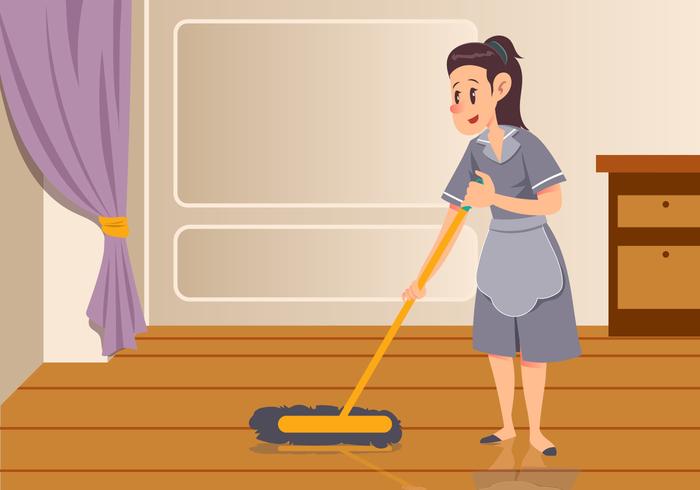Have you ever heard the saying, “Don’t sweep the floor at night?” This seemingly harmless household chore can sometimes be shrouded in a thick layer of superstition, stirring up anxieties about bad luck and misfortune. While the modern world often dismisses such beliefs as mere folklore, these age-old customs have persisted for centuries, revealing fascinating insights into human history, cultural practices, and the enduring power of tradition.

Image: reviewhomedecor.co
This ingrained belief, prevalent across various cultures, is thought to stem from a mix of practical, religious, and spiritual apprehensions. The act of sweeping the floor at night, according to this superstition, can disrupt the flow of good fortune, usher in negative energy, or even inadvertently sweep away prosperity. To better understand the origins of this enduring practice, let’s delve into the historical and cultural contexts that led to its emergence and continued relevance.
Origins and Cultural Context
Historical Roots:
Many cultures around the world have their own unique interpretations and beliefs surrounding the timing of sweeping the floor. In some cultures, the practice is considered disrespectful towards the ancestors or spirits who are believed to reside in the household. Sweeping at night is seen as a way of disrupting their peace and inviting their displeasure, which could manifest as illness, misfortune, or even loss of wealth.
For instance, in ancient Chinese culture, the act of sweeping was connected to the concept of Qi, the vital life force that permeates everything. Sweeping at night was believed to scatter the accumulated positive Qi, leaving the home vulnerable to negative energy. This belief aligns with the practice of Feng Shui, which emphasizes harmonious energy flow within a space.
Folklore and Superstition:
The widespread nature of this superstition is also evident in folklore and legends. In certain cultures, sweeping the floor at night is associated with the belief that it could sweep away the wealth and good fortune that may have entered the household during the day. This is particularly true for families whose livelihoods depended on agriculture or trade, where even a small loss could be detrimental.
Additionally, the nocturnal world was often regarded with fear and trepidation in ancient societies. Darkness was seen as a time when spiritual entities were more active, and disturbed spirits or vengeful ghosts could be attracted to the dust and debris swept away from the home. This fear of the unknown, coupled with the belief in the supernatural, further fueled the prohibition of nighttime sweeping.

Image: www.richmond-news.com
Practical Considerations and Hygiene
A Practical Perspective:
Beyond the realm of superstition, there are practical reasons why sweeping at night might have been discouraged in the past. In pre-modern times, homes were often dimly lit and without the convenience of modern lighting. Sweeping in the dark posed a safety hazard, increasing the risk of tripping over objects or injuring oneself.
Moreover, homes were typically less hygienic than modern residences, and sweeping at night could stir up dust and dirt, making it difficult to sleep or breathe comfortably. It’s likely that sweeping was primarily done during daylight hours when individuals could ensure their safety and hygiene.
Health and Sanitation:
It’s important to note that while the superstition of sweeping at night might have stemmed from historical and cultural factors, modern hygiene practices emphasize the importance of maintaining clean living spaces, regardless of the time of day.
In the 21st century, with our understanding of germs and infectious diseases, regular cleaning and sanitation are essential for our health and well-being. Sweeping the floor, regardless of the time, helps to remove dirt, allergens, and potentially harmful microorganisms, promoting a healthier environment for everyone.
Modern Interpretations and Cultural Diversity
While the belief in the ill-fortune associated with nighttime sweeping may seem outdated in the modern world, it still lingers on in certain communities and families. This cultural legacy can be seen as a reflection of deep-seated beliefs and traditions that have been passed down through generations.
For some, the superstition remains deeply ingrained, and they continue to avoid sweeping the floor at night out of respect for their ancestors or to avoid potential bad luck. However, for others, it has become a mere reminder of the past, a curious anecdote passed along with humorous stories of their grandmothers’ beliefs.
It’s important to acknowledge the diversity of cultural perspectives that exist regarding this practice. While some may adhere to the superstition strictly, others may interpret it more loosely, acknowledging the practical aspects of sweeping but adhering to the belief out of tradition or respect.
Don’T Sweep The Floor At Night
Conclusion:
The superstition of “Don’t sweep the floor at night” offers a fascinating glimpse into the complex interplay of history, culture, and folklore. While the practice might seem outdated in the modern era, it serves as a powerful reminder of the enduring influence of traditions and beliefs on our lives. Ultimately, the decision to embrace or disregard the superstition is a personal one, reflecting individual values, cultural background, and personal beliefs. However, understanding the historical and cultural context surrounding this practice can enrich our understanding of the world and the shared human experience that binds us together.






